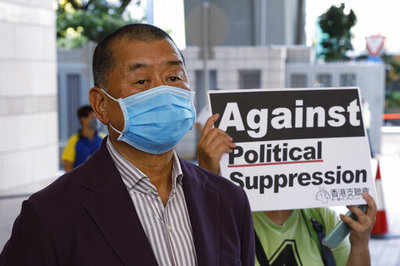
File photo: Hong Kong media tycoon Jimmy Lai
HONG KONG: Hong Kong media mogul Jimmy Lai, one of the city’s most vocal Beijing critics, was arrested Monday under a new national security law for colluding with foreign forces, deepening a crackdown on democracy supporters.
“They arrested him at his house at about 7am. Our lawyers are on the way to the police station,” Mark Simon, a close aide, told AFP, adding that other members of Lai’s media group had also been arrested.
A police source speaking on condition of anonymity told AFP Lai was arrested for colluding with foreign forces — one of the new national security offences — and fraud.
Lai owns the Apple Daily newspaper and Next Magazine, two outlets unapologetically pro-democracy and critical of Beijing.
On Twitter, Simon said officers were executing search warrants at both Lai’s mansion and his son’s house.
Few Hong Kongers generate the level of vitriol from Beijing that Lai does.
For many residents of the restless semi-autonomous city, he is an unlikely hero — a pugnacious, self-made tabloid owner and the only tycoon willing to criticise Beijing.
But in China’s state media he is a “traitor”, the biggest “black hand” behind last year’s huge pro-democracy protests in Hong Kong and the head of a new “Gang of Four” conspiring with foreign nations to undermine the motherland.
Lai spoke to AFP in mid-June, two weeks before the new security law was imposed on the city.
“I’m prepared for prison,” the 72-year-old said. “If it comes, I will have the opportunity to read books I haven’t read. The only thing I can do is to be positive.”
He described the law as “a death knell for Hong Kong”. “It will supersede or destroy our rule of law and destroy our international financial status,” he said.
He also said he feared authorities would come after his journalists. The security law targets secession, subversion, terrorism and colluding with foreign forces.
It was brought in to quell last year’s often violent protests. Both China and Hong Kong have said it will not affect people’s freedoms and only targets a minority.
But its broadly-worded provisions criminalise certain political speech, such as advocating for sanctions, greater autonomy or independence for Hong Kong.
Critics, including many Western nations, believe the law has ended the key liberties and autonomy that Beijing promised Hong Kong could keep after its 1997 handover by Britain.
Lai is no stranger to arrest. He is already being prosecuted for taking part in last year’s protests — and for defying a police ban to attend a vigil in early June commemorating Beijing’s deadly Tiananmen crackdown in 1989.
Source link
